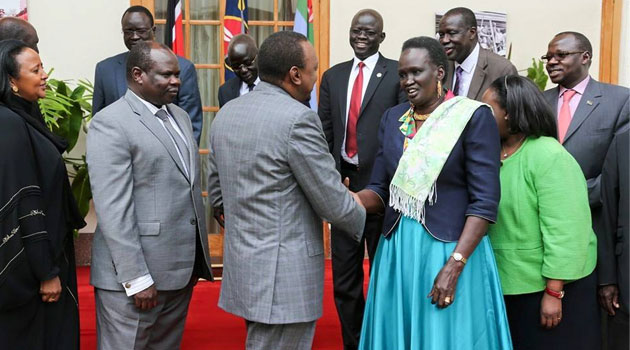
Rebecca Nyandeng, the opposition figure and widow of the late SPLM leader John Garang de Mabior, said she got the information about her appointment into the national dialogue committee through media.
“I did not know anything about this appointment into the national dialogue. I just heard it in the media”, Rebecca told Sudan Tribune on Wednesday.
The former presidential advisor said she was still considering what to do, stressing that a successful national dialogue should be inclusive for all the stakeholders.
Mrs Garang further said a genuine and meaningful dialogue was the only way to salvage the situation the country was going through. She reiterated a call for unity of purpose, saying the country was bigger than individuals.
“I want the people of South Sudan to unite and speak with one voice, the voice of reason. Our unity can be the biggest and strongest weapon with which we can address the situation,” she stressed.
In August 2014, President Kiir dismissed his advisor on gender issues and human rights, for her support to calls for democratic reforms. At the time, presidential spokesperson Ateny Wek Ateny said Nyandeng had been “working for the downfall of the government” and should have been fired long ago.
Former south Sudanese deputy defence minister Majak D’ Agoot, a prominent of the former political detainee said his colleague, Kosti Manibe, was also appointed without prior knowledge.
It was not immediately clear whether Kosti, unlike Nyandeng, who said was not consulted, was appointed through an intermediary role. Majak asserts that the appointments into the committee should have been made in a way that reflects the interest of the group than individuals.
The officials were reacting to the decision of President Kiir on Tuesday evening reconstituting the membership of the National Dialogue Steering Committee after the co-chair of the committee, Retired Roman Catholic Bishop Paride Taban, declined the appointment in March.
The newly reconstituted dialogue body will now be jointly co- chaired by Abel Alier and Angelo Beda. The vice chair would be Gabriel Yol Dok Bona Malual Madut with Francis Mading Deng acting as the rapporteur and former Fashoda governor William Othon as a deputy rapporteur.
Several prominent members of each community across South Sudan were appointed to the steering committee. Notable members from Aweil community includes Gen. Kawac Makuei Mayar, Gen. Albino Akol Akol, Garang Deng Aguer.Arthur Akuein Chol Kuol Athian Mawien, Aldo Ajou Deng Akuey, Edward Lual Deng Khon, Lily Albino Akol and South Sudan youth Union president Bol Dhieu.
Figures from other communities were Gen. James Hoth Mai, Gen. Pieng Deng Kuol, Sheikh Juma Musa Said, Joseph Ukel Obango, former Central Equatoria state governor, who is now the presidential advisor on special affairs, Clement Wani Konga and several religious leaders.
Foreign nationals appointed to the Steering Committee of the National Dialogue include Bethwel Kiplagat, General Lazaro Sumbeiywo and Reverend Samuel Kobia representing Kenya.
General Sumbeiywo was appointed by President Uhuru Kenyatta in December 2013 as a peace mediator for South Sudan. Sumbeiyo was the chief mediator of the 2005 peace agreement that ended the more the two-decade north- South conflict.
All the neighbouring countries will have a representative in the steering committee and the secretariat will comprise two members each from the Centre for Peace and Development Studies, Ebony Centre and three members of the South Sudan Council of Churches and a member of the Islamic Council.
The SPLM In Opposition calls for a new peace process to stop the war and ensure the implementation of August 2015 peace agreement, adding that the revived agreement would provide the roadmap for a national dialogue.
Last March, the Catholic Auxiliary Bishop of Juba, Reverend Santo Laku Pio called to create a conducive environment for the political process and to release political prisoners and other detainees who are arrested without trial.
(ST)
